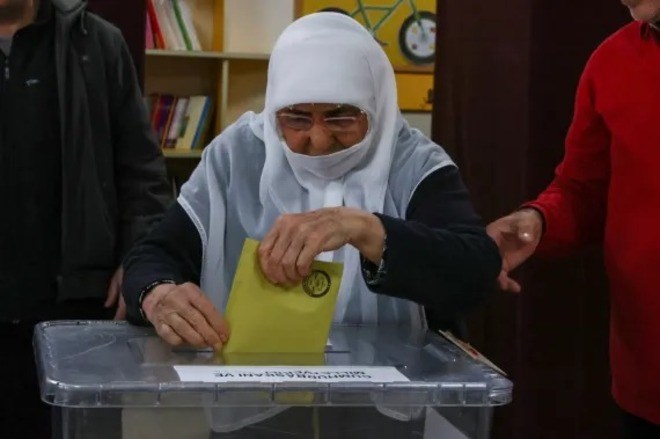
Sunday May 14, 2023
Istanbul (HOL) - As Turkish citizens head to the polls on Sunday, it is clear that this is one of the most fiercely contested elections in recent history. President Recep Tayyip Erdogan and his ruling Justice and Development Party (AK Party) are facing their most significant political challenge yet, with both the presidency and parliament in the balance for a five-year term.
Erdogan's primary rival, Kemal Kilicdaroglu, the seasoned social democrat leader of the Republican People's Party (CHP), Turkey's main opposition party, is proving a formidable opponent. Erdogan's two decades of rule, characterized by populist strategy, are under severe test from an energized opposition and a nation grappling with a myriad of challenges.
The election battleground is dominated by key issues, such as the struggling Turkish economy, recent earthquakes, brain drain concerns, the refugee crisis, and a heated debate over values and identity in the predominantly Muslim country. The economy is a particularly pressing issue, with Erdogan's unorthodox interest rate cuts leading to a devaluation of the Turkish lira and a 24-year peak in inflation last year.
In response, Erdogan and his team have devised a plan to win back support, which includes wage increases, cheap credit for homebuyers, tax amnesties, and a significant public sector recruitment drive. Despite this, the AK Party is attempting to leverage Turkish voters' nationalist sentiment, controversially linking the opposition alliance, the Table of Six, with the pro-Kurdish People's Democracy Party (HDP) and accusing them of ideological ties to the Kurdish armed group, PKK.
Meanwhile, the CHP has sought to broaden its coalition, softening its stance on the hijab and promising to return Turkey to the Eurovision Song Contest, a point of cultural pride for many Turks. Kilicdaroglu has also focused his campaign on addressing the cost of living crisis, a notable contrast to Erdogan's focus on conservative "family values."
Both candidates ended their campaigns on symbolic notes. Erdogan concluded with a communal evening prayer at Hagia Sophia in Istanbul, reciting passages from the Quran, while Kilicdaroglu was in Ankara visiting the mausoleum of Mustafa Kemal Ataturk, the founder of modern Turkey, urging his supporters to "change the country's destiny."
 Kilicdaroglu (L) visited Ataturk’s mausoleum in Ankara left flowers. Erdogan (R) attended the evening prayers at Hagia Sophia.
Kilicdaroglu (L) visited Ataturk’s mausoleum in Ankara left flowers. Erdogan (R) attended the evening prayers at Hagia Sophia.
The election is under close watch by Europe due to Erdogan's close ties with Russian President Vladimir Putin and strained relations with the European Union, which has raised alarm among NATO members, especially considering Turkey's role in circumventing sanctions on Moscow over its war in Ukraine.
Turkey, second in the world among OECD countries for voter participation, is expected to see a turnout of 89% of the voting-age population and 95% of registered voters. Millions of Turks living abroad, who account for 3.4 million of Turkey's 64.1 million registered electorate, have already cast their votes. These diaspora voters could have a significant impact on the election's outcome.
The main pro-Kurdish party, the HDP, has backed Kilicdaroglu in the presidential race. However, the party, representing about a fifth of Turkey's population, has faced criticism for its lack of alternatives in the elections and its alleged "terror" ties.
This election marks a crucial moment in Turkey's political history. Despite Erdogan's potential to secure another term, the race remains tight, with some polls giving a slight edge to Kilicdaroglu. If neither candidate secures over 50 percent of the ballots cast in the first round, a runoff will be held on May 28.
AKP officials plan to rely on emotional appeals in the event of a runoff, presenting Erdogan's potential final term as deserving of one final victory. However, they acknowledge that the results of the parliamentary elections, also held today, will significantly influence the presidential race.
 A woman votes at a polling station during the presidential and parliamentary elections, in Ankara, Turkey May 14, 2023. REUTERS/Yves Herman
A woman votes at a polling station during the presidential and parliamentary elections, in Ankara, Turkey May 14, 2023. REUTERS/Yves Herman
As polling stations open, the tension is palpable. The AKP is banking on retaining a majority in parliament as a "psychological boost," asserting that Turkish people dislike cohabitation. Yet, as AKP officials brace themselves for the results, the reality is stark: this is no easy election, and the margins are microscopic.
Regardless of the outcome, one thing is clear: the campaign strategies, the fiery rhetoric, and the last-minute giveaways have been a testament to the high stakes of these elections. As Turkey's citizens cast their votes, the world watches on, waiting to see how this critical juncture will shape the future of Turkey's political landscape.
Media organizations are barred from reporting partial results until an embargo is lifted at 9 pm (1800 GMT). Therefore, the full scale of the election and its impact will not be fully understood until late Sunday evening. Only time will tell whether this election will mark the continuation of Erdogan's rule or a new chapter in Turkey's political history led by Kilicdaroglu.